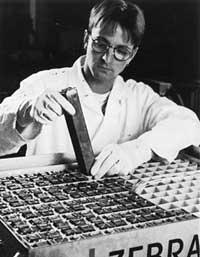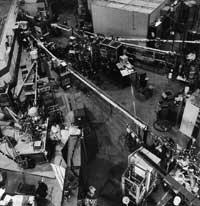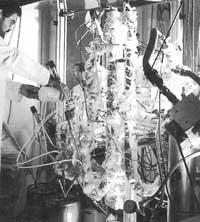First centenary of the Helium
1995/09/01 Kaltzada, Pili - Elhuyar Zientziaren Komunikazioa Iturria: Elhuyar aldizkaria

It must be known that helium can be detected in one of the ten atoms of the universe, which makes it a basic element. The question arises to everyone immediately: how is it possible that until 1895 we have no news of helium?
History and stories
The answer to this question is given by the helium itself: the lighter, colorless and odorless noble gas. In other words, helium meets all the requirements necessary to remain hidden, since its lightness makes its detection difficult mixed with other elements.

The discovery of helium was the result of chance. Although on Earth there are large amounts of helium, for the first time the element baptized with the name helium was detected in the Sun. The first news of helium is due to researcher Norman Lockeyer, creator and director of the journal Nature. Working in a viewpoint built in his own house, he was fascinated by the yellow light that could be seen around the Sun.
He studied with the spectroscope and his charm became a surprise. Although he tried to renew what was seen in the laboratory, it proved impossible. This gave him the last impulse he needed to launch his hypothesis: The yellow light around the Sun was originated by an element until then unknown. He opened to the four winds the news of his discovery, but the researchers of his time did not consider it and for many years had to keep hidden the testimony of the new element.

In 1885 he received the deserved recognition of Lockeyer. Scottish chemist William Ramsay was investigating the uranium ore. Suddenly, the yellow light that Lockeyer detected around the Sun appeared on his eyes. Ramsay needed a week to receive the recognition he refused his predecessor. It is the anniversary of this last discovery that is celebrated this year.
Use of fugaz helium
Currently, helium is used to make arc welds and to handle nuclear lasers or reactors. Divers also use helium to lengthen time under water and avoid breathing problems. In any case, the best known part of helium is its cooling capacity. The temperature of 269ºC is sufficient to cool any substance or element to helium. On the other hand, helium is the only element that does not solidify. He has won, therefore, the fame of the rare element.
The frenetic search for helium began in 1950. Until then, the industry showed no great tendency to use helium. From that year, however, it was decided to build storage deposits of helium and proceeded to the detailed study of gas. When it was first isolated in gas cylinders, it began the way to the success of helium.

Among other things, most of the trips made by NASA are due to helium. The spaces combine oxygen with hydrogen to obtain a fuel that allows to remain in space for a long time. The transport of special fuel is not easy and to meet the safety conditions it is necessary to keep it at low temperature. This is the requirement of helium.
The consumption of helium has increased continuously in recent years. The extension of the area of use and the fact that the sectors that use large amounts of helium are leading are, together with others, the causes of the annual increase in the consumption of helium of 10%.

Gai honi buruzko eduki gehiago
Elhuyarrek garatutako teknologia






